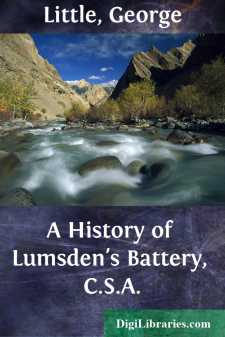History
- Africa 30
- Americas (North Central South West Indies) 50
- Ancient 68
- Asia 58
- Australia & New Zealand 8
- Canada 41
- Caribbean & West Indies 1
- Civilization 20
- Eastern Europe 12
- Europe 310
- Expeditions & Discoveries 60
- General 77
- Historical Geography 1
- Jewish 9
- Latin America 3
- Medieval 8
- Middle East 13
- Military 248
- Revolutionary 8
- Study & Teaching 5
- United States
- Western Europe 56
- World 13
United States Books
Sort by:
CHAPTER I The First, or Forenoon, Battle of Winchester, Indecisive—Sheridan's and Early's Mistakes—The Capture. "War is Hell," said our great strategist, General W. T. Sherman. According to its latest code, with few or no exceptions, the end justifies the means, and, if necessary to success, it is right to do wrong. Fifty years ago one of the fairest regions on earth was that...
more...
CHAPTER I BACKGROUNDS In 1862, less than a year after he had assumed his post in London, the American Minister, Charles Francis Adams, at a time of depression and bitterness wrote to Secretary of State Seward: "That Great Britain did, in the most terrible moment of our domestic trial in struggling with a monstrous social evil she had earnestly professed to abhor, coldly and at once assume our...
more...
PREFACE The writer of this book was a volunteer officer in the Union army throughout the war of the Great Rebellion, and his service was in the field. The book, having been written while the author was engaged in a somewhat active professional life, lacks that literary finish which results from much pruning and painstaking. He, however, offers no excuse for writing it, nor for its completion; he has...
more...
Chapter 1. Introductory These pages record some of the adventures of the First South Carolina Volunteers, the first slave regiment mustered into the service of the United States during the late civil war. It was, indeed, the first colored regiment of any kind so mustered, except a portion of the troops raised by Major-General Butler at New Orleans. These scarcely belonged to the same class, however,...
more...
by:
George Little
At the close of the spring term of the Circuit Court of Tuscaloosa County, Alabama, in May, 1861, Judge Wm. S. Mudd announced from the bench that Mr. Harvey H. Cribbs would resign the office of Sheriff of the County for the purpose of volunteering into the Army of the Confederate States and would place on the desk of the Clerk of the Court an agreement so to volunteer signed by himself, and invited all...
more...
by:
John Filson
Curiosity is natural to the soul of man, and interesting objects have a powerful influence on our affections. Let these influencing powers actuate, by the permission or disposal of Providence, from selfish or social views, yet in time the mysterious will of Heaven is unfolded, and we behold our conduct, from whatsoever motives excited, operating to answer the important designs of heaven. Thus we behold...
more...
PREFATORY For those who dwell within its borders, or whose ancestral roots are bedded among its hills, the claims of Litchfield County to distinction are many and of many kinds. In these latter days it has become notable as the home of certain organizations of unique character and high purpose, which flourish under circumstances highly exceptional, and certainly no less highly appreciated. It is as...
more...
by:
John Frost
Daniel Boone. In all notices of border life, the name of Daniel Boone appears first—as the hero and the father of the west. In him were united those qualities which make the accomplished frontiersman—daring, activity, and circumspection, while he was fitted beyond most of his contemporary borderers to lead and command. Daniel Boone was born either in Virginia or Pennsylvania, and at an early age...
more...
TO AN IMPARTIAL WORLD. No. I. The unconstitutional oppression long and unremittingly practised upon the colonists of Texas, having at length become insupportable, and having impelled them to take up arms in defence of their rights and liberties, it is due to the world that their motives, conduct and causes of complaint should be fully made known. In order to do this it will be necessary to explain the...
more...
INTRODUCTORY.—“Our Mississippi, rolling proudly on,Would sweep them from its path, or swallow up,Like Aaron's rod, those streams of fame and song.”Mrs. Hale. The valley of a river like the channel of a man's career, does not always bear proportion to the magnitude or volume of the current, which flows through it. Mountains, forests, deserts, physical barriers to the former—and the...
more...











